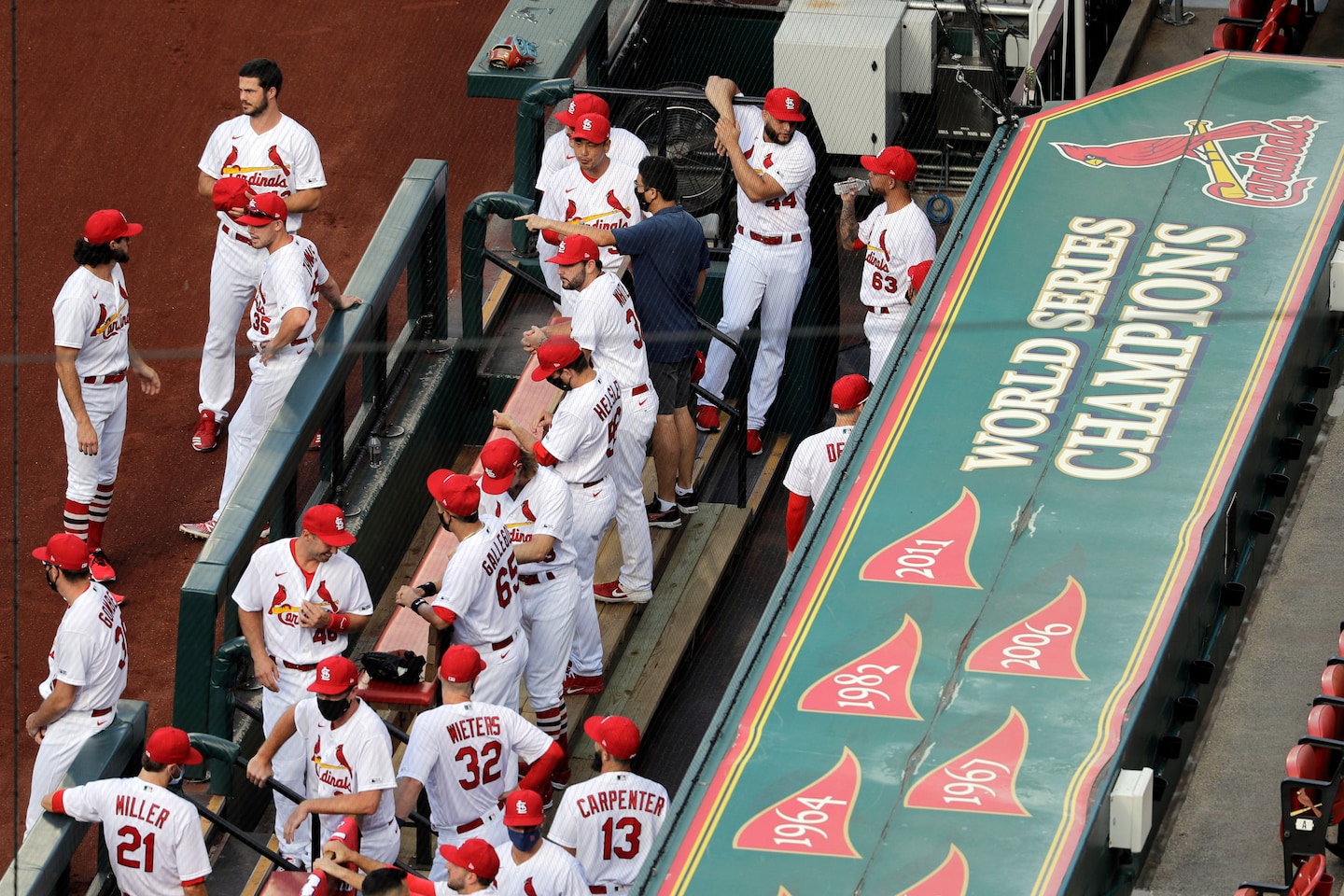Cardinals’ coronavirus outbreak grows to 13 positives; another series postponed

The Cardinals’ four-game series in Detroit against the Tigers, which was to begin Tuesday, was scrapped in the wake of Monday’s news, and the Cardinals remain under self-isolation at their Milwaukee hotel, where they have been since Thursday and where a scheduled three-game series against the Brewers over the weekend was also postponed. At this point, the Cardinals’ next scheduled game is Friday in St. Louis against the Chicago Cubs.
The major outbreaks among the Cardinals and Marlins — the latter of whom had 18 players and two coaches test positive, leading to a week-long shutdown that is scheduled to end Tuesday — have alarmed people across the sport, leading to a strengthening of MLB’s health and safety protocols and a renewed emphasis on social distancing and responsible behavior on the road.
Both outbreaks were initially believed to have originated while the teams in question were on the road; however, Cardinals team president John Mozeliak said Monday that contact tracing led him to believe theirs originated in St. Louis and spread after the team departed for its trip to Milwaukee.
Despite the grim news from the Cardinals and Marlins — and a tally of virus-related postponements that has now reached 19 less than two weeks into the season — MLB has insisted the season will go on, with Commissioner Rob Manfred telling ESPN on Saturday: “We are playing. The players need to be better, but I am not a quitter in general and there is no reason to quit now. We have to be fluid, but it is manageable.”
MLB has insisted it accounted for the possibility of major outbreaks in expanding rosters to 60 players, including a 30-man supplemental roster, and it believes — at least in the case of the Marlins — that questionable behavior on the part of players, and not a flaw in the health and safety protocols, led to the rapid spread. Among the measures MLB has put in place to strengthen those protocols was to call for each team to designate a protocol-compliance monitor to ensure proper behavior.
Marlins CEO Derek Jeter, addressing the media for the first time since that team’s outbreak, acknowledged, “Some of our traveling party had a false sense of security and comfort when we left Miami.” Jeter said some players, while in Atlanta for an exhibition game, left the hotel to get coffee, buy clothes and/or attend a dinner at a friend’s house, but there was no “salacious activity” and “no running around the town.”
“Guys got around each other, got relaxed and let their guard down,” Jeter said.
Notably, Jeter also said the decision to play the Marlins’ game at the Philadelphia Phillies on July 26 — by which point the team already had received word of four players testing positive over the previous 72 hours — was not made exclusively by Marlins players, as was previously reported, but was made collectively by the Marlins, Phillies and MLB officials.
That decision has come under intense scrutiny, particularly after MLB, by contrast, moved swiftly to postpone this past weekend’s Cardinals-Brewers series in the wake of a handful of positives among the Cardinals.
Regardless of fault, the outbreaks have shaken some players’ confidence in the safety of competing during a pandemic, as evidenced by five players opting out of the season since the opening weekend, when the Marlins’ outbreak came into view. The fifth of those players, veteran pitcher Shelby Miller, who was on the Brewers’ supplemental roster, announced his decision Monday.
If there was good news for MLB, it was from the Phillies, who reported no new positive tests for the fourth straight day, paving the way for the resumption of their season Monday night in New York against the Yankees and suggesting the virus cannot easily jump from team to team in the course of competition.
The Phillies, after hosting the Marlins for three games, reported three positive tests — two of which were believed to have been false positives — and were shut down for a week “out of an abundance of caution,” according to MLB.
MLB intends to make up as many of the lost games as possible, instituting a rule under which doubleheaders would feature seven-inning games, but has also acknowledged the possibility some teams wind up playing fewer than 60 games, in which case division standings and playoff seeding could come down to winning percentage.






